All the Answers
Well-known member
The future of the Income Tax divides the governors: the three positions to negotiate with the Casa Rosada - Infobae

Source:
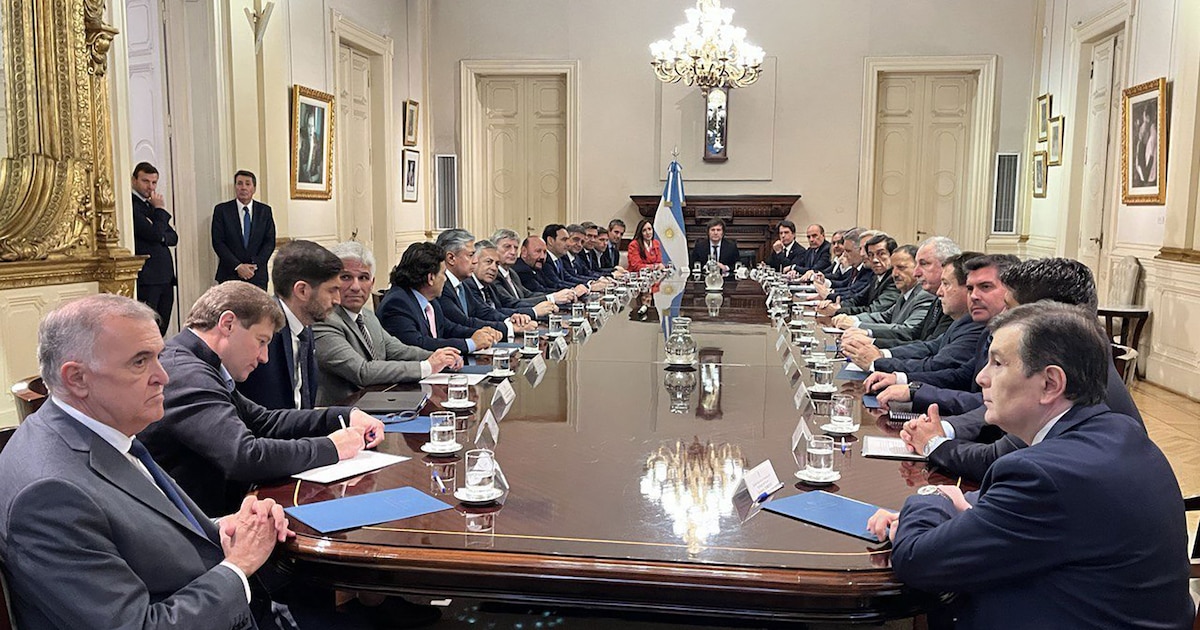
El futuro del impuesto a las Ganancias divide a los gobernadores: las tres posturas para negociar con la Casa Rosada
El Gobierno quiere acelerar el acuerdo con los mandatarios provinciales para que respalden la nueva Ley Ómnibus a cambio de fondos. Guillermo Francos se reunirá hoy con los representantes del norte grande
March 26, 2024
The Government wants to accelerate the agreement with the provincial leaders so that they support the new Omnibus Law in exchange for funds. Guillermo Francos will meet today with the representatives of the great north
By Joaquin Múgica Diaz
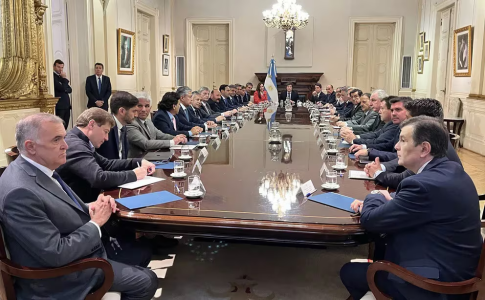
The governors are divided into three positions regarding the return of Profits (@estoesblender)
There is a meeting point between all the governors . The drop in revenue has been dramatic. The economic outlook is even more devastating when the impact of devaluation, inflation, recession, increased rates, the brakes on public works and the SME crisis are added. The adjustment already has visible consequences that the leaders do not ignore and about which they are concerned.
Faced with this film, they seek and demand compensation for the fiscal hole that was generated by the elimination of the fourth category of income tax. The Government, in return, asks them to support the main articles of the new Omnibus Law , much smaller than the one that failed in February. That is what the governors of the great north will talk about this Tuesday, at 10, when they meet at the Salta Convention Center, with the Minister of the Interior, Guillermo Francos.
The FONID, transportation and energy subsidies, the situation of public works, the infrastructure projects of the bi-oceanic corridors, the reversal of the northern gas pipeline, the fiscal package and access to oncological medications appear on the agenda to be discussed.
Regarding how to compensate the collection, there are three positions among the 24 leaders . Some want the income tax to be restored as it was until last year; others that a tax be applied to high incomes, with other salary categories and payment methods; and a third group does not want taxes on workers' income and asks for compensation through the Country tax or the check tax.
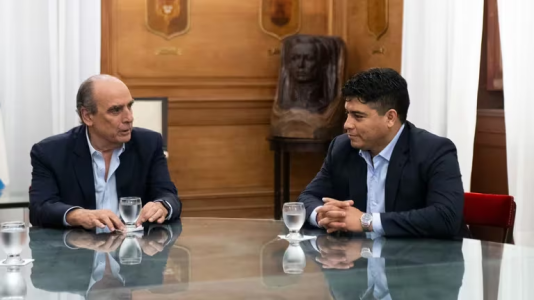
The governor of Santa Cruz, Claudio Vidal, made it clear to Francos last week that he does not negotiate the return of Profits
The governor of Santiago del Estero, Gerardo Zamora , proposed that the funds lost due to the reduction of Profits be obtained from a mix between the sharing of the check tax and the Country tax. They understand that it could be supported because that agreement was the one signed in the Casa Rosada last year by all the governors, including those who had already been elected. But the government was different.
On this last point, the national government already has a position taken. Neither of these two taxes will enter the negotiation with the governors. It is an immovable decision. At least, that's how they convey it in Balcarce 50. Regarding the Country tax, they assure that it makes no sense because they will remove the stocks in a short period of time. Regarding the check tax, the decision is entirely political. The truth is that for the ruling party neither of the two is a bargaining chip.
One of those who demanded the sharing of the Country tax was the governor of Córdoba, Martín Llaryora, who tried to have the issue discussed in the chamber during the vote on the Omnibus Law. He did not succeed and the negotiation with his deputies fell apart. On this occasion, the man from Córdoba proposed that there be a tax on high incomes. An alternative path to explore an agreement.
What is the difference between this tax and Profits? “We propose that the floor at which payment begins be higher. Close to $2,000,000. And graduate income to payment. "That whoever must pay does not do so in full from the beginning, but rather increases the percentage in stages," they explained in the Córdoba governorate.
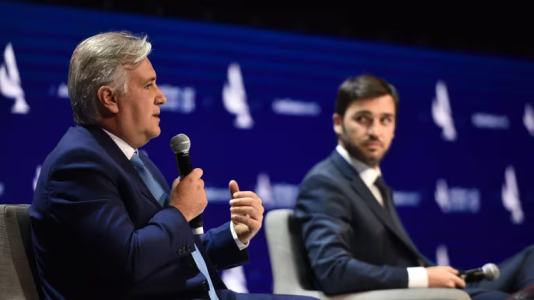
The block of Patagonian governors is against the restitution of the Income Tax
The Patagonian governors do not want the restitution of the Income Tax. The key is that many workers in the private and state sectors have very high salaries, due to the salary regime of the area and the activities they carry out. Gustavo Melella (Tierra del Fuego), Claudio Vidal (Santa Cruz), Alberto Weretilneck (Río Negro), Rolando Figueroa (Neuquén), Ignacio Torres (Chubut) and Sergio Ziliotto (La Pampa) are noted on that list .
“This has nothing to do with Patagonia, only, it is a question of the workers. "No one should pay income tax ," said Vidal from Santa Cruz , last week, after the meeting he had with Francos. It was forceful a few minutes after having been exchanging positions with one of the main people in charge of carrying out the negotiation to approve the new law.
“There is nothing to negotiate with the issue of Profits. Many people earn high salaries because they are in unfavorable areas and the cost of living is very high. Much more than other places in the country. Furthermore, the Government imposes ideas and does not listen to proposals. We are not very different than at the beginning of the year,” they explained in one of the Patagonian governorates. The complaint of some leaders is that the Government does not make concrete decisions, which is why agreements are delayed and bogged down.
For many weeks now, the Government has been trying to find a uniform position among the leaders to agree on the restitution of the tax, but it has not been able to do so. “Those who do not want the return of the tax are no more than 10, out of 24 leaders ,” they warned in the Casa Rosada, making it clear that the majority is there to achieve a consensus.
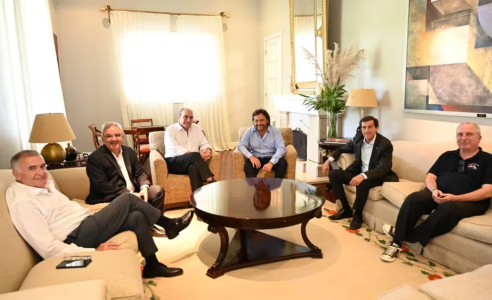
Guillermo Francos will meet this Tuesday with the governors of the great north (@GustavoSaenzOK)
Furthermore, they highlight that, unlike in January, when the first Omnibus law was negotiated, the Government listened to the leaders and acted accordingly. “We sent the draft of the project, we met with them and their legislators, we issued a measure to increase pensions as they had asked us, we reduced the companies to privatize and we reduced the project by more than 300 articles. Now it's their turn ," they said in Balcarce 50.
“The governors made the Government understand that we had to dialogue and negotiate or we were not going to pass the laws. We all have to give in. This moment in Argentina does not exist without there being a political cost on both sides,” said an important official from the Casa Rosada, where they now expect greater willingness from the leaders to reach an agreement on the fiscal package and the new law.
In the last hours, the Minister of Economy, Luis “Toto” Caputo, was optimistic about the restitution of the Income Tax. “I see a greater willingness on the part of the governors to accompany, because they see that if they do not accompany they will be left out. We prove that even without the law we are going to order the public accounts anyway. “That is our negotiating power,” he assured.
Among the governors the view is different. They do not see that this majority agreement exists, rather they believe that we must work to achieve the greatest possible consensus on a common position. But they do not envision a return of the Income Tax supported by the majority, as proposed by the ruling party. Different views of a new and tedious negotiation with many interests involved.
On Thursday of next week the leaders will meet with Francos at the Casa Rosada. The meeting is already scheduled, after the postponement it suffered yesterday due to, as explained by the Government, agenda problems of the guests. Javier Milei wants to close an agreement with the governors to be able to pass the law. And he wants to do it as soon as possible. On the other side of the counter they ask for definitions and clarifications. Fewer meetings and more concrete responses to your requests.

